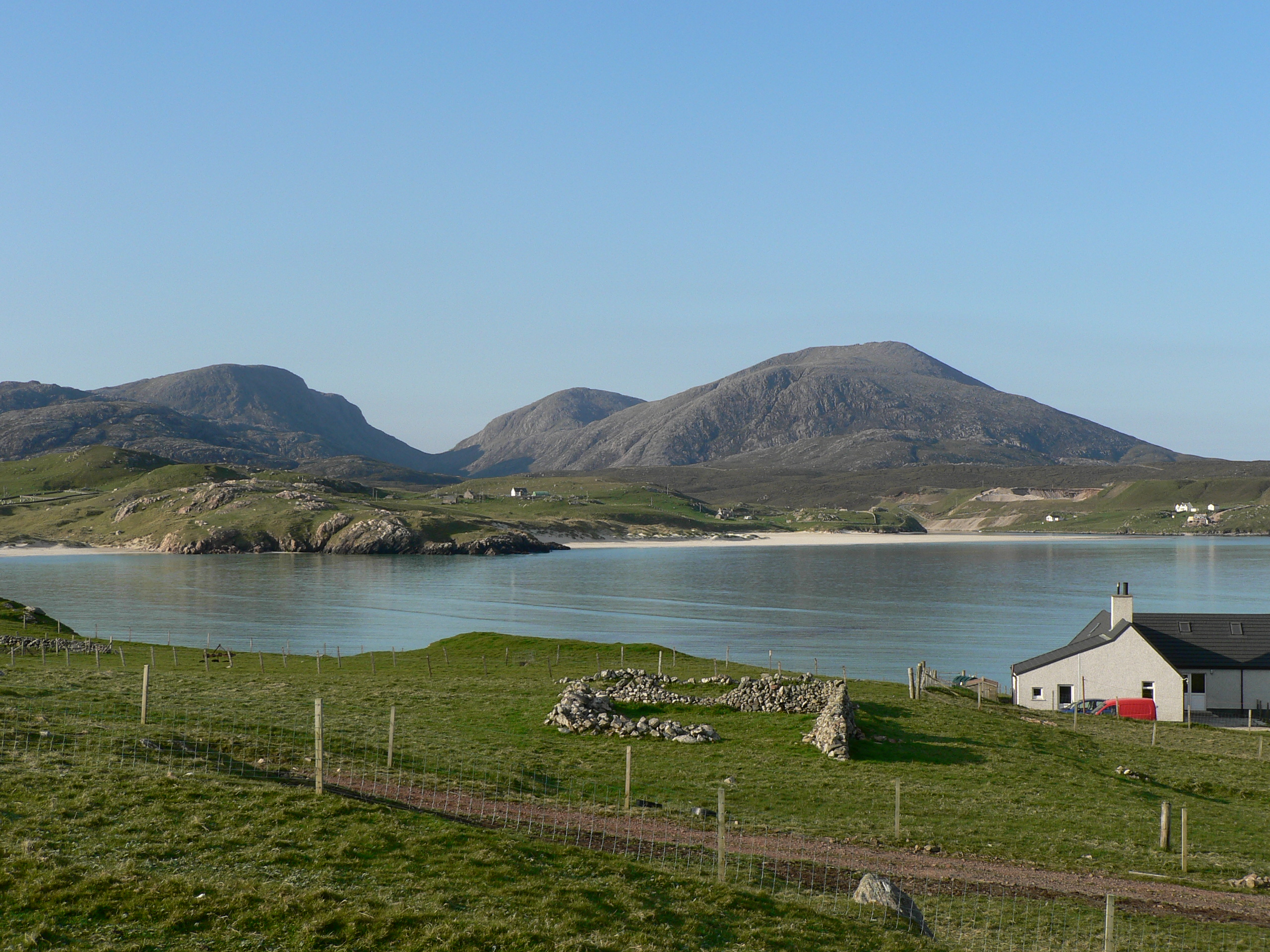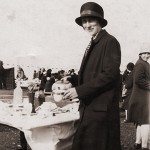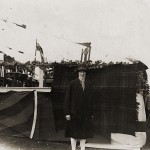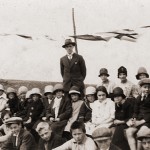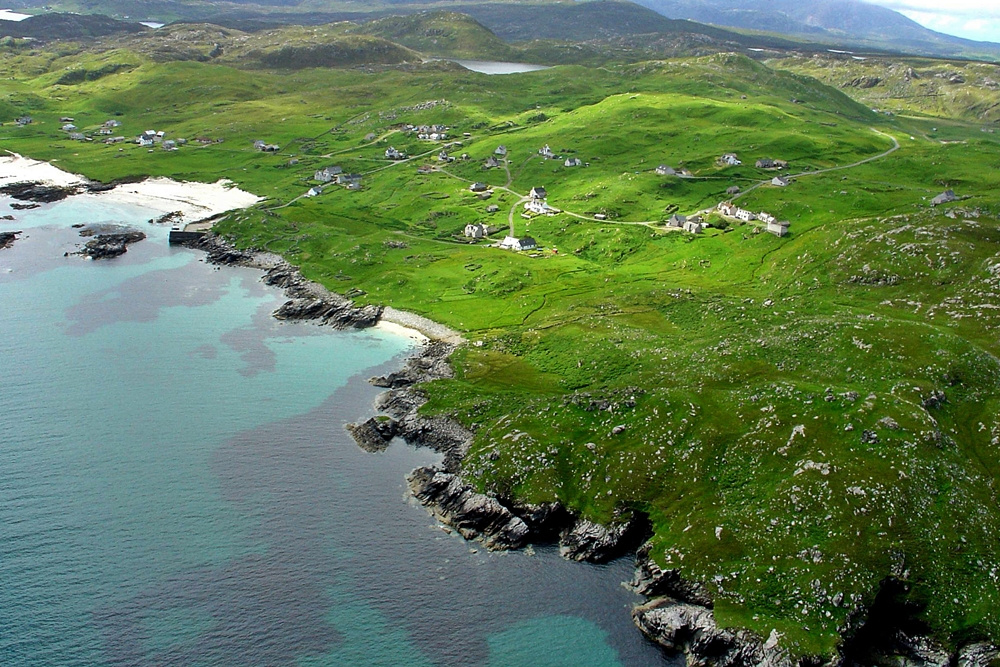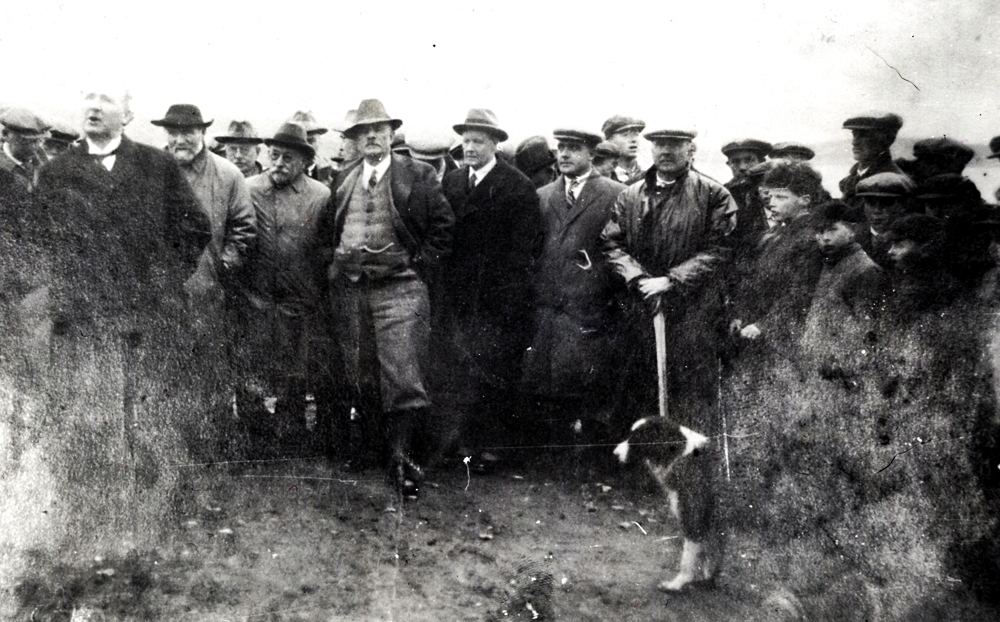Tag: valtos (page 4)
Four Uigeachs in Sydney
TB Macaulay’s Speech
On TB Day, 18 June 1929, TB Macaulay of the Sun Life Assurance Company, Montreal, visited Valtos and was presented with an illuminated address by Rev Malcolm Maclennan, on behalf of the people of Uig. Rev Maclennan gave a speech, and TB followed, as reported by the Gazette:
Mr Macaulay, acknowledging the presentations, said it was not an easy thing to reply to such an address as he had been listening to, and to express his thanks for such as welcome as they had been kind enough to give him. He would have been glad naturally to come to Valtos, but as he had realised the warmth and enthusiasm of their welcome he felt humbled and overwhelmed, because after all he could not help asking himself why he should be so signally honoured. there was only one reason that would not apply to scores of other right there in that crowd, and that was that he had been blessed by providence with the means that enabled him to do some things that many others present would have been willing and glad to do if they had the opportunity. After explaining the ways in which he had first become interested in Lewis, Mr Macaulay said that, beginning with his reply to the appeal in connection with reconstruction of the Stornoway Municipal Buildings, he got into it, and the more he got into it, the more he felt the call of the blood. (Applause.) And he felt that, as he had been blessed financially, he wanted to give away something, and he decided that he should give it, first, where he would be interested, and second, where it would do good. (Applause.)
That was the beginning of his interest in Lewis, and since then he had got in deeper and deeper, and gradually got visions of what might be done to improve conditions in the Island. He did not need to tell them what he had endeavoured to do, for they had recounted very kindly in the Address some of the things he had done. Scotsmen and Highlanders, and Islanders even more so, he continued, had a feeling of affection for their old home, and somehow he felt, standing in the home of the Macaulays, as if he had been there before. (Applause.) The place seemed to him to be inhabited by the spirits of his ancestors. (Applause.) These forebears of theirs had looked around on these same hills that he was looking at now, n the same scene of beauty that was all around them there. He was really more happy than they could possibly imagine to feel that he had a claim in that place, and that he was not just like some visitor, some Englishman, looking round and saying, “This is a beautiful spot.” So it is a beautiful spot, said Mr Macaulay, but it is more, it is your spot, and it is my spot. (Loud applause.)
An Dotair Ruadh
(picture of Valtos and Kneep by Chris Murray)
An Dotair Ruadh, Donald Macaulay, seventh in line from Dòmhnall Càm, was the son of Dòmhnall mac Sheorais, the tacksman of Linshader who himself became something of a legend because of his size and strength. His son has come down in tradition as equally renowned, but for being something of a chancer. He was a brother of Lily Macaulay who married Rev Robert Finlayson of Lochs, and it seems was also a cousin of Mac an t-Sronaich.
William Matheson reports that he was a small man in black with a red beard and a fiery temper. He studied medicine at Aberdeen but never practiced formally, apparently because he had been expected to succeed Dr Miller in Stornoway and when he was disappointed, he turned to farming instead.
He took a series of tacks, and seems to have made a practice of withholding the rent because of some alleged failure of the proprietor, and going to court over it.
Rev Maclennan’s Speech on TB Day
Pic: some of the worthies of Uig and Stornoway at the ceremony.
TB Macaulay, president of the Sun Life Assurance Company of Montreal and descendent of the Macaulays of Uig, visited Lewis in the summer of 1929 to open the new Municipal Buildings in Stornoway (replacing those destroyed in the fire of 1918) and to continue various development projects he had already begun, including the co-operative Macaulay Farm at Arnish. They arrived on 15 June and stayed at Lews Castle as guests of the community, hosted by the Provost Louis Bain and his wife; on their first night a huge bonfire was lit on Goat Island to salute them. They spent three weeks on the island, and on 18 June visited Uig on what became known as an Latha TB – TB Day.
The Gazette reported that sixty motor cars came out from Stornoway to join most of the population of Uig, and parked on the high flats above Valtos – being unable to get down the steep hill to the village. A platform had been erected, with flags and a piper, and an outdoor ceremony took place. TB was greeted by the four oldest men in the village, led by Hector Matheson (97). After a welcome from Murdo Maclean (of Uig and Stornoway), Rev Malcolm Maclennan presented TB with an “illuminated address” and made the following speech.
A Dhaoin’ Uaisil Uig! (Noblemen of Uig. Let me so address you in terms used of old by outsiders, when speaking of your ancestors.) We assemble on this familiar spot to-day to welcome a gentleman only a few ‘Knees’ (as our Gaelic idiom has it) removed from one whose hearth glowed and whose home flourished, attached to this soil – Mr T. B. Macaulay, of Montreal. (Applause.) For the honour of this day’s proceedings we are indebted to the untiring energy and organising genius of our esteemed Chairman [Murdo Maclean] – himself so well known here in his own parish – and who will be long honoured by us for having – shall I not say ? – ‘discovered’ for us our guest, and, not only for introducing him to the Island and to the parish of his forebears and of his Chief, but for having arranged his transport from Montreal so as to make Stornoway his first port of call-a singular thing in ocean travel. (Applause.) If one could dare suggest a possible improvement on what is perfect in this case, it would be to express the wish that it could have been arranged that the ‘Minnedosa’ should have made its first call in Caolas Phabaidh, in sight, if not within hail, of the old hearth of the Macaulay home.
Valtos School 1928-9
Rev Malcolm Maclennan
Valtos School 1954
Valtos School 1958
Ailig Mackay and his son Calum, 15 Valtos
The Postman
Landslide in Glen Valtos, 1920
Pabbay Sheep
Òran Màiri Dhall (Och nan och, tha mi fo mhulad)
Màiri, born 1841, was a daughter of Murdo Maciver and Mary nee Morrison, of Pabbay, 11 Kneep and later 25 Valtos. She emigrated to the United States and while there suffered greatly with homesickness and composed the song Och nan och, tha mi fo mhulad. According to tradition she lost her sight with the associated weeping but it is more likely that her blindness was caused by some substance used in her daily work in a laundry. Màiri did eventually return home to Uig. Her grandfather Norman Morrison was also blind, a consequence of his service in Egypt with the Ross-shire Buffs (78th).
Does anyone know more verses than these nine?
Nuair a rinn mi airson fàgail
Fhuair mi beannachd mo chàirdean
Ghabh mi ’n t-aiseag air a’ bhàt’
Gu ruig’ sàil nam beann mòr.
Och nan och, tha mi fo mhulad
Dhomhsa tha mo chòmhradh duilich
’S cruaidh an càs ach ’s fheudar fhulang
’S mi fuireach ann an coille mhòir.
Nuair a thàinig mi air fòrladh
A dh’Amearagaidh a chòmhnaidh
Chunnaic mi a’ sin luchd eòlais
Anns gach dòigh sa robh iad ann
Tornado in West Uig
Iain Ruadh of Valtos
TB Day
Colonials Return, 1918
Excerpts from Stornoway Gazette, Local and District News (Uig)
April 5th, 1918
FRIENDS FROM ACROSS THE SEA: One of the few pleasurable results of this terrible and miserable war is the occasional opportunity offered to friends and relations at home of meeting and welcoming friends and relations from beyond the seas – friends whom, in the ordinary course of events, they might never have then chance of seeing. Long ago many families from Uig and elsewhere were forcibly and unjustly ejected from their happy, if humble homes, and banished to far-off lands in order to make room for sheep and deer. The descendants of those evicted, disregarding the injustice and the wrong so glaringly inflicted upon their ancestors, listened to the call of duty, took up arms in defense of the Mother Country, and offered their services -their lives possibly – in order to help and save her from the tyranny of a treacherous and cruel foe. These come in their hundreds and thousands from all quarters of the globe – from the far West of Canada, to the Far East of Australia and New Zealand, and all the Colonies in between. Ties “lighter than air but stronger than iron bands”, bind these Colonists to the home country, and particularly to the “old haunts” of their forebears, and during their respite from military duties they take the opportunity of visiting these scenes and seeing the descendants of their forefathers’ compatriots. We also are delighted to see these scions of the old stock, and glory in the realisation of a connecting link between our own present and the past generation of old stalwarts and graceful beauties of whom we have heard so much. What also gives very great pleasure is the fact that many of these speak fluently, the old mother tongue, and, what is no less surprising, they speak it with practically the same tone and accent as if they have been born, and brought up within sound and sight of Traigh Mhoir Uige.

